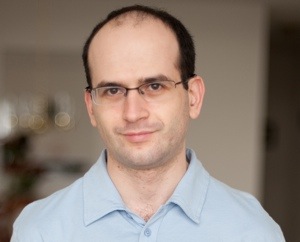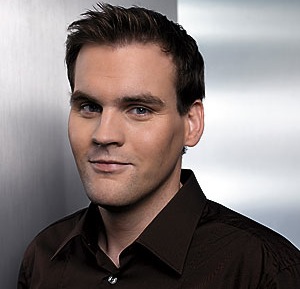 In this interview B10WH.com presents Igor Seletsky, CEO of CloudLinux. Igor has created a fantastic software automation product, an OS that helps web hosting companies and SaaS provides to optimize resource usage on their servers and to prepare for the Cloud. I can even say that CloudLinux saves smaller hosting providers from fierce competition of larger corporate hosters. I’m not saying superlatives about Igor or about his company’s software. Ask anyone and you’d find out that CloudLinux (CL) is a very popular hosting automation solution. But this is not the reason to feature Igot at B10WH. I wanted to speak to him because I knew he was a great guy and our readers would like meeting him. Here he is!
In this interview B10WH.com presents Igor Seletsky, CEO of CloudLinux. Igor has created a fantastic software automation product, an OS that helps web hosting companies and SaaS provides to optimize resource usage on their servers and to prepare for the Cloud. I can even say that CloudLinux saves smaller hosting providers from fierce competition of larger corporate hosters. I’m not saying superlatives about Igor or about his company’s software. Ask anyone and you’d find out that CloudLinux (CL) is a very popular hosting automation solution. But this is not the reason to feature Igot at B10WH. I wanted to speak to him because I knew he was a great guy and our readers would like meeting him. Here he is!
Tell me how did you come up with the idea to create CloudLinux?
I knew about the problem facing Shared Hosting companies for years. I had developed H-Sphere since 1997, and one of the most critical issues was always single customer affecting all other customers. Yet, we never had a good approach to deal with it. Nor did any of our competitors. So, after few years of not doing software for hosting industry, I took a look at what is going on – and noticed that this problem is still not addressed by anyone. I researched it a bit, and figured out that I have an elegant solution for it. Hence – CloudLinux.
Did you develop H-Sphere alone? I remember it was quite popular at the time! Can you share with B10WH.com readers how many of you worked on the H-Sphere project?
I started PSOFT (the company behind h-sphere) with a partner back in 1997. In 2005, when it was sold to Comodo, the company had 60+ people, most of them working on H-Sphere, or providing tech support for h-sphere.
OK. I’m curious why didn’t you continue developing web hosting control panels? Was it because you needed to work on something innovative which would resolve any particular technical issue in Shared Hosting industry?
I felt the need to expand the sales/marketing expertise, as well as technical team to compete with cPanel & Parallels. That was the main reason for selling company to Comodo. I thought there is enough control panels on the market, and didn’t want to do something that was already done.
Are you saying you are not tempted to add a hosting control panel as add-on product to CloudLinux in the future?
Not at all. I don’t think there is a need on the market for another control panel. cPanel and Parallels are doing quite a good job, and people who don’t like either of those have a choice of ISPManager, DirectAdmin, InterWorx, HostingController, WebMin, and probably few others that I haven’t heard about.
Which control panels are compatible with CloudLinux?
All that I listed above, and probably some others. Anything that works on CentOS, will work on CloudLinux. We also have quite a few people running CloudLinux with their own, home grown solutions.
Please now explain CloudLinux for dummies! What does it do? What makes it valuable and important for server administrators?
Back in 2010 we asked hosting companies to list top 3 reasons for server downtime. Single customer causing server downtime was the number one reason. Such incidence cause downtime more often then hardware or software failures, security issues, software updates or any other reasons. What CloudLinux does – it prevents ability of customer to cause such downtime. We effectively limit CPU & memory usage of the customer, so if customer starts to overload server – limits will be applied, and customer’s site will be limited (and will be slow or down). Yet, all other sites on the server will not notice any issues.
It is funny. When you say – “We effectively limit CPU & memory usage of the customer, so if customer starts to overload server – limits will be applied, and customer’s site will be limited” – this sounds exactly whata customers do not want. but it is actually more important for site owners, than for web hosts… because CloudLinux keeps the servers up and running and those hosted on them should be happy about it Isn’t it like that?
Yes, and no. Imagine you have a server with 500 users. One of them causing downtime. 499 of those users really want that solution.
Actually, that extra one customer also want that solution, because when his site brings down the server, the downtime affects him as well. Of course some customers are limited at the moment when they just start slowing down the server, or just hit the limit. Yet, because we provide exact metrics, and show how much CPU was used, and when – most of them are accepting it, and hosts use such data to upsell heavy customers to VPS solutions.
Do you think that hosting providers who use CloudLinux should advertise it to customers and to say things like “Powered by CloudLinux”? Are you working to make CloudLinux popular to all site owners or you need it to be recognizable on an enterprise level only?
Many hosts already advertise CloudLinux as a way to show higher stability. And many resellers recognize CloudLinux as a stability factor, and only want to be placed on servers with CloudLinux.
Hmm… that’s great. This means that ClouLinux reached a level of reputation which is making it something like a standard in the Linux hosting market?
I believe so. Lots of people recognize the name now, especially among cPanel hosts.
I have met with the executives of many web hosting providers who have deployed CloudLinux and are happy about it. My personal opinion is that CloudLinux is going to become or even has become a standard in web hosting industry and this is not a compliment, because I meant it. I know all customers are important and that you might not want to point attention to any particular hosting provider, but I’m curious who was the first hosting provider to buy and deploy CloudLinux?
We had several running it at pretty much the same time. uk2 was one of the first ones.
This is interesting. Does CloudLinux fit to their OneApp Cloud platform? Is it integrated with it?
Sure. OnApp comes with CloudLinux template, and lots of hosts who use OnApp, also use CloudLinux
You now, when I do these interviews, my objective always is to show to the B10WH.com readers, who’s behind the technology. So let’s talk about you. Are you graduated in computer science and how important was your education for your today’s business?
I was doing CS degree, but I never graduated. I started PSOFT instead. The education was pretty important, as it gave me enough knowledge to understand underlying technology.
It is funny. I know many fine professionals in this industry who are either top executives or owners of popular brands and did not have time to graduate because put all their energy in business! What does your wife says about that?
My wife just completed her Phd, and thinks it is a total disgrace that I left college :)
You know, the smart people who do PHd’s and the university professors should always remember that there is a real business that support in academics and the universities.
I think it was a mistake on my part to abandon college. It wasn’t the best decision for sure.
You told me once you have 3 kids. On which side of the technology business do you see them – as consumers or as professionals?
I will let them decide!
Someone might say it is irresponsible not to guide your kids ;) but the truth is that you are probably a very good father, if you want them to choose by themselves. Most parents don’t do this?
I don’t know, but I think it would be irresponsible to decide for them. It is their life, and they should have a chance to make their choices. Of course they still have to get college education, and I will have some troubles explaining them why it is a must have.
How far will you go with CloudLinux. Which direction is it going to go. Will you develop it more like an OS (Os itself) or it will be an application for the Red Hat family operating systems. Or you are going to try building any kind of one-stop automation solution for hosting providers (excluding the control panels, as fas as you said you are not doing control panels anymore)?
CloudLinux is an OS, it is a fork of RHEL, but we plan to keep it as close to RHEL as possible. The goal is to make it the best OS for Shared Hosting companies and we are concentrating solely on that.
Can anyone install it as stand-alone OS on a server or they need to have a RHEL OS installed on the server first?
Anyone can install it from the disk (we provide ISO image), though majority of people have pre-installed CentOS, and convert instead.
We are speaking a week prior to World Hosting Days conference in Germany. What do you expect from this event. And where CloudLinux is more popular by the way? Is it in the United States and Canada, in Europe or Asia?
CloudLinux is most popular in US, UK, followed by Asia and Eastern Europe. We don’t have lots of penetration in Germany and other western European countries, as that market is prefers Debian & Suse – which makes it more difficult for them to switch to CL.
WHD looks very exciting this year. It sounds like it is going to be biggest hosting event ever, and we are looking forward to meet our existing and future customers.
Thank you very much for your time Igor. I’m speaking to you in 2011 and I hope that when we’re doing the next interview CloudLinux will be even bigger and the OS will become a true standard in Shared Hosting.
 Germany’s United Internet bought web hosting company Strato, owned by Deutsche Telekom. According to the reports in the press, United Internet paid for around €600 million ($629 million) in cash. It takes on 2 million customer contracts and approximately €130 million in annual revenue. This another step toward consolidation of the European web hosting market. The company already owns popular web hosting, domain registration and online service brands 1 & 1, FastHosts, InternetX, Sedo, Web.de, GMX, Mail.com, etc.
Germany’s United Internet bought web hosting company Strato, owned by Deutsche Telekom. According to the reports in the press, United Internet paid for around €600 million ($629 million) in cash. It takes on 2 million customer contracts and approximately €130 million in annual revenue. This another step toward consolidation of the European web hosting market. The company already owns popular web hosting, domain registration and online service brands 1 & 1, FastHosts, InternetX, Sedo, Web.de, GMX, Mail.com, etc.


